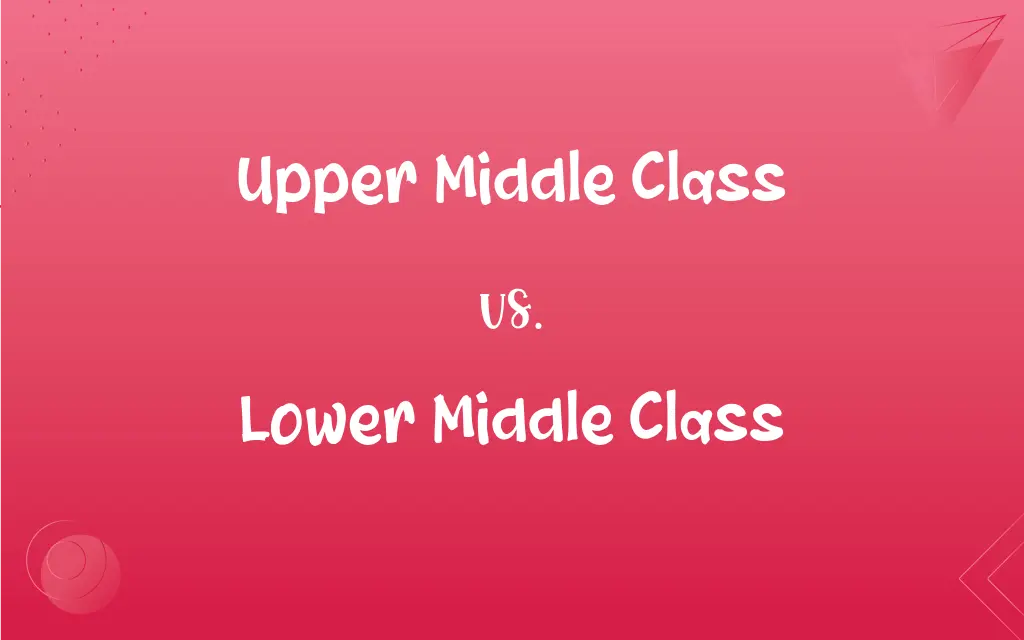Upper Middle Class vs. Lower Middle Class: What's the Difference?
Edited by Harlon Moss || By Janet White || Published on January 11, 2024
The upper middle class generally has higher income, education, and professional status than the lower middle class, which typically holds modest managerial or technical positions with moderate income.

Key Differences
The upper middle class typically consists of individuals with high educational qualifications, often holding advanced degrees, and working in professional or managerial roles. In contrast, the lower middle class often includes individuals with some college education or vocational training, working in lower-level managerial or technical positions.
In terms of income, the upper middle class enjoys a significantly higher income bracket, affording a comfortable lifestyle with discretionary spending. The lower middle class, while stable, usually has a more modest income, focusing on meeting basic needs with limited discretionary spending.
The upper middle class often has access to considerable resources, including home ownership in affluent neighborhoods and private education for children. The lower middle class, however, may have more limited resources, often residing in more modest neighborhoods and relying on public education.
Lifestyle and cultural pursuits also distinguish these classes. The upper middle class might engage in exclusive leisure activities and have a keen interest in arts and politics. The lower middle class, though aspirational, tends to have more constrained access to such activities, focusing more on practical and affordable recreation.
Social networks and influence differ as well, with the upper middle class having networks that include other professionals and influential individuals, aiding career and social advancement. The lower middle class, while possibly having a diverse network, often lacks connections to power and significant influence.
ADVERTISEMENT
Comparison Chart
Income Level
Higher, allowing for comfortable lifestyle and savings
Moderate, focused on basic needs with limited savings
Education
Advanced degrees, often in prestigious institutions
Some college or vocational training
Professional Status
High-level professionals or managers
Lower-level managers or technical roles
Lifestyle and Culture
Affluent neighborhoods, private education, exclusive leisure activities
Modest neighborhoods, public education, practical recreation
Social Networks
Broader and influential, aiding in career and social advancement
More constrained, with less access to influential networks
ADVERTISEMENT
Upper Middle Class and Lower Middle Class Definitions
Upper Middle Class
A socio-economic group characterized by high income, education, and professional success.
The upper middle class family enjoyed vacations abroad every summer.
Lower Middle Class
Individuals with some post-secondary education or training, holding positions with limited advancement opportunities.
Most of the neighborhood comprised lower middle class workers, employed in local industries.
Upper Middle Class
A segment of society with significant discretionary income and high cultural capital.
The upper middle class neighborhood was known for its exclusive clubs and private schools.
Lower Middle Class
A segment of society that focuses on meeting basic needs with some room for leisure and recreational activities.
The lower middle class community organized affordable recreational programs for families.
Upper Middle Class
A class distinguished by lifestyle choices, including affluent housing and private education.
Their upper middle class status was evident in their choice of designer clothing and luxury cars.
Lower Middle Class
A socio-economic group characterized by moderate income and stable employment, often in technical or lower managerial roles.
The lower middle class family lived in a modest home and valued education.
Upper Middle Class
Individuals holding advanced degrees and occupying senior professional or managerial positions.
Most residents in that area are upper middle class, working in high-ranking corporate roles.
Lower Middle Class
Households typically owning or renting homes in modest neighborhoods, with access to public services.
Their lower middle class background was reflected in their practical and hardworking approach to life.
Upper Middle Class
A group often involved in shaping community and political landscapes through influence and resources.
The upper middle class members of the town often spearhead major community initiatives.
Lower Middle Class
A class often aspiring for upward mobility and greater financial security.
The lower middle class parents worked diligently to provide better opportunities for their children.
Upper Middle Class
Occupying the upper part of the middle socioeconomic range in a society
Lower Middle Class
Occupying the lower part of the middle socioeconomic range in a society.
Lower Middle Class
Occupying the lower part of the middle socioeconomic range in a society
FAQs
What are typical jobs for the upper middle class?
Jobs in senior management, law, medicine, or business.
How does the upper middle class influence society?
Through significant contributions in politics, culture, and community services.
What defines the lower middle class?
Moderate income, stable employment in technical or lower managerial roles.
How does education differ in the lower middle class?
Often some college education or vocational training.
What lifestyle is associated with the lower middle class?
Modest living focusing on meeting basic needs and practical recreation.
What lifestyle is associated with the upper middle class?
Comfortable with discretionary spending, often in affluent neighborhoods.
What education level is common in the upper middle class?
Often holding advanced or professional degrees.
Can lower middle class individuals move to the upper middle class?
Yes, through education, career advancement, or entrepreneurial success.
What role does the upper middle class play in education?
They often have access to private education and significant educational resources.
What are typical jobs for the lower middle class?
Jobs in lower management, skilled trades, and technical roles.
What defines the upper middle class?
High income, advanced education, and professional or managerial roles.
Is upward mobility common for the lower middle class?
It can be challenging but achievable with education and career opportunities.
Do upper middle class individuals always have high savings?
Generally, yes, due to higher incomes and financial planning.
Is home ownership common in the upper middle class?
Yes, often owning homes in sought-after areas.
How do social networks differ between these classes?
Upper middle class networks are often more influential and extensive.
What financial struggles might the lower middle class face?
Limited discretionary spending and challenges in saving for the future.
What kind of neighborhoods do lower middle class people live in?
Typically in modest but stable neighborhoods.
Do lower middle class individuals have access to leisure activities?
Yes, but more focused on affordable and practical options.
Are cultural pursuits different for these classes?
Yes, the upper middle class often engages in more exclusive cultural activities.
How do these classes view education for their children?
Both value education, but the upper middle class often has more resources for private or advanced education.
About Author
Written by
Janet WhiteJanet White has been an esteemed writer and blogger for Difference Wiki. Holding a Master's degree in Science and Medical Journalism from the prestigious Boston University, she has consistently demonstrated her expertise and passion for her field. When she's not immersed in her work, Janet relishes her time exercising, delving into a good book, and cherishing moments with friends and family.
Edited by
Harlon MossHarlon is a seasoned quality moderator and accomplished content writer for Difference Wiki. An alumnus of the prestigious University of California, he earned his degree in Computer Science. Leveraging his academic background, Harlon brings a meticulous and informed perspective to his work, ensuring content accuracy and excellence.






































































